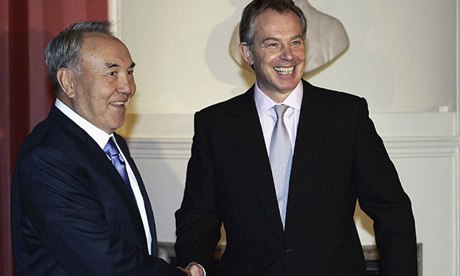Britain is not the only western nation cosying up to Kazakhstan, one of the world's biggest 20 oil producers. The country is of strategic value, for energy and security reasons, as it sits on formidable hydrocarbon reserves, and also along a transportation route that is vital for Britain to ship military kit home from Afghanistan as it withdraws troops by 2015.
But as David Cameron woos the Kazakh president, Nursultan Nazarbayev, on the first trip by a serving British prime minister to the sprawling state the size of western Europe sandwiched between Russia and China, he may find the 72-year-old leader an uneasy bedfellow.
Nazarbayev is a seasoned autocrat who has been in power for more than 20 years and who likes to win elections with 95% of the vote or more. He brooks no dissent or opposition and muzzles media outlets that dare question the wisdom of his rule.
Cameron must be aware that Kazakhstan is a country where "dishonest elections have become the norm, opposition parties are not registered, independent media are shut down, and inconvenient politicians are convicted by tame courts and jailed", says opposition politician Amirzhan Kosanov. The British prime minister should press Nazarbayev on this, "but unfortunately oil always outweighs ideals and democratic values on the scales".
Astana denies abusing political freedoms and human rights, and Nazarbayev recently opined that his country's glass of democracy is half or three-quarters full. His administration is fond of chanting the mantra that democracy is a work in progress.
Yet Kazakhstan's beleaguered opposition tells a different story: as Cameron strokes Nazarbayev's ego, one prominent opposition leader, Vladimir Kozlov, is languishing behind bars serving a seven-and-a-half year term for fomenting violence and plotting Nazarbayev's overthrow.
The charges stem from fatal unrest in Kazakhstan's oil-rich west in 2011, when an energy workers' strike turned violent and 15 demonstrators died in a hail of police gunfire. Astana reacted with a political crackdown, closing Kozlov's political party and banning many independent media outlets.
Kozlov's wife, Aliya Turusbekova, considers it naïve to believe Cameron will press Nazarbayev over human rights or her husband's imprisonment, because Britain sees Kazakhstan as a place to "open new markets for itself, or obtain cheap raw materials". Nevertheless, she says, international contacts are a plus for Kazakhstan and her jailed husband, forcing Astana to restrain some of its more authoritarian impulses.
Kazakhstan's human rights record may look woeful, but Nazarbayev has good spin doctors. Chief among them is Tony Blair, who has a multimillion-pound contract with Astana to advise on governance.
Nazarbayev likes to strut the world stage posing as an elder statesman, and he has won kudos from the international community over his nuclear non-proliferation efforts (Kazakhstan voluntarily gave up nuclear weapons at independence) and his amenable attitude towards security co-operation with the west over Afghanistan.
As Cameron poses for a photo with Nazarbayev, human rights activists are urging him not to turn a blind eye to Kazakhstan's record.
"Cameron has a real opportunity to confirm that human rights are a central focus of UK foreign policy during his upcoming visit to Kazakhstan – he can, and should, raise concern about ongoing and serious human rights violations in Kazakhstan with President Nazarbayev and other government officials," said Mihra Rittmann of Human Rights Watch.









